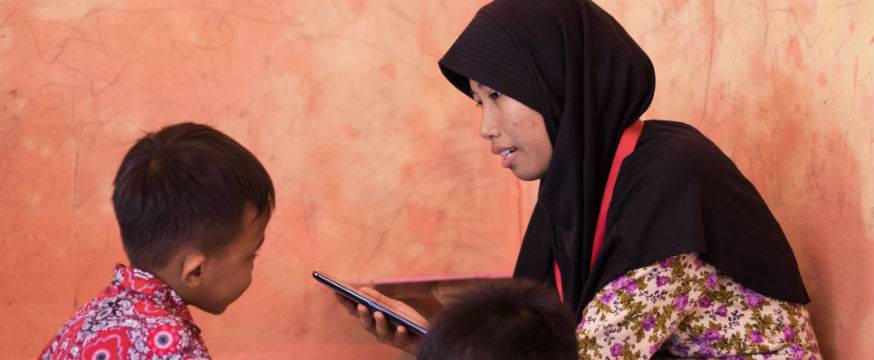
Improving access to pre-primary education for all in Indonesia
Research 7 Sep 2018 4 minute readACER is working with the Indonesian Government to support children not participating in early childhood programs who are falling behind in their learning and development.
A study of children in Indonesia by the Australian Council for Educational Research (ACER) has found that the learning and development outcomes of children who do not attend formal early childhood and care (ECEC) programs are significantly lower than peers enrolled in preschool.
The report, which was commissioned by UNICEF and supported by IKEA Foundation as part of a broader early childhood intervention program, looked at 5- and 6-year-old children living within two kilometres of ECEC centres in the Bogor Regency, West Java Province, measuring children’s learning and developmental outcomes, as well as social and emotional development and background factors like the home learning environment.
In addition to lower learning and development outcomes, children not attending formal ECEC programs were found to have fewer educational resources at home and to live in less cognitively stimulating home environments. It is an illustration of the multiple and compounding challenges children from low-socioeconomic status families face; when families cannot afford to send their children to ECEC programs or provide educationally enriching home environments, children fall behind before even beginning school.
The report by ACER’s Dan Cloney, Syifa Andina, Dian Fikriani and Fitria Anggriani recommended that those children not currently enrolled in ECEC programs receive additional support aimed at reducing the inequity of opportunity. This could be done in two ways: by supporting existing services (including health services) in the region to help families improve the home learning environment, through giving children more stimulating activities and adopting better health and hygiene practices; and by aiding participation in ECEC programs through reducing barriers to access, including price.
The report says this kind of intervention could be embedded into the services of existing providers outside formal ECEC programs, like the widely attended local integrated health service and planned birth centre (Posyandu), which could also refer families to local ECEC programs with spaces available. Similarly, the report says, community libraries and community centres could be supported to offer children access to educational books and games and to assist their parents in engaging with their children’s learning and development through play.
There is strong evidence that children from vulnerable backgrounds who would otherwise fall behind can catch up to their peers when they attend high-quality ECEC programs. These improved outcomes contribute valuable public benefits in the forms of reduced high-risk and antisocial behaviour, increased employment and tax revenues, and increased productivity.
A previous study by ACER, as part of its Analytical and Capacity Development Partnership (ACDP) with the Government of Indonesia, found that millions of children were missing out on access to formal pre-primary programs (Taman Kanak-kanak). The Indonesian Government recognises the importance of ECEC and has put improving access to quality programs – with an emphasis on a holistic approach that includes promoting social and emotional development, in addition to learning outcomes – firmly on the national agenda. In order to cater to such a large number of children, this will require an approach that recognises that other kinds of ECEC programs, like playgroups (Kelompok Bermain), may have to rise to the challenge and provide high-quality education and care programs to ensure all children get the best start in life.
Further information:
The full report, ‘Baseline Study for the Modelling of Universal Pre-Primary Education in the District of Bogor, West Java Province, Indonesia’, by Dan Cloney, Syifa Andina, Dian Fikriani and Fitria Anggriani, will be released at a later date.
